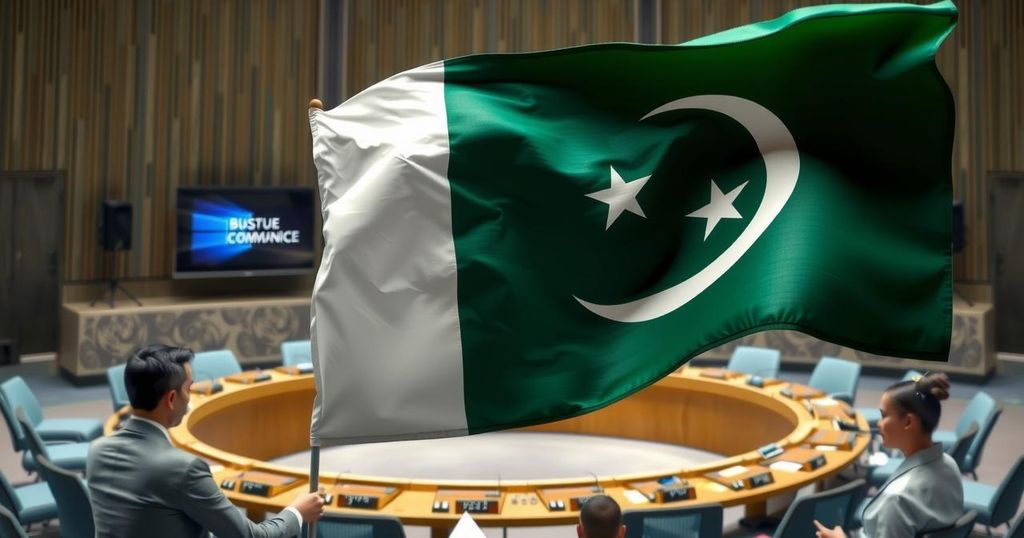Pakistan commenced its eighth term as a non-permanent member of the United Nations Security Council, highlighted by the ceremonial installation of its flag. This term, which will last from 2025 to 2026, allows Pakistan to influence major global discussions and to take a seat on the ISIS and Al Qaeda Sanctions Committee. The Ambassador emphasized Pakistan’s dedication to the principles of the UN Charter and support for self-determination.
On Thursday, the Pakistani national flag was ceremonially installed at the United Nations Security Council (UNSC) as the nation commenced its eighth term as a non-permanent member for the period of 2025-2026. This installation was marked by a press release from the Permanent Mission of Pakistan to the United Nations. Following its election in June, Pakistan replaced Japan and now occupies one of the two Asia-Pacific seats within the 15-member UNSC.
As a newly appointed member, Pakistan will preside over the Council in July, providing a vital platform for shaping discussions on pressing international issues. This eighth term is viewed as both an opportunity to influence key debates and a challenge to navigate complex global realities. The ceremony featured the installation of flags for the five new non-permanent members, including Denmark, Greece, Panama, Somalia, and Pakistan, and was executed by Pakistan’s Alternate Permanent Representative, Ambassador Asim Iftikhar Ahmad.
In addition to its seating, Pakistan will assume a position on the Islamic State (ISIS) and Al Qaeda Sanctions Committee, which plays a critical role in identifying individuals and organizations associated with terrorism for sanctions. The Security Council, entrusted with the responsibility of maintaining international peace and security, comprises five permanent members and ten non-permanent members, with five of the latter changing annually.
During his address at the ceremony, Ambassador Ahmad conveyed that Pakistan remains committed to the fundamental principles of the UN Charter, emphasizing the importance of international peace, security, and the promotion of friendly relations among nations. He asserted, “Pakistan will always remain a strong voice for peoples under foreign occupation and oppression and the realisation of their right to self-determination.”
Ambassador Ahmad further articulated Pakistan’s dedication to cooperative multilateralism, asserting that addressing the root causes of conflicts through dialogue is essential for achieving peace. Stressing the importance of the UN’s role in this matter, he stated that Pakistan is determined to utilize its position on the UNSC to actively pursue just solutions to the global issues faced by the Council and to contribute to peacebuilding efforts worldwide.
The United Nations Security Council, a principal organ of the UN, plays a pivotal role in maintaining international peace and security. With 15 members, including five permanent members with veto power and ten elected non-permanent members, the Council is responsible for making binding decisions, imposing sanctions, and authorizing military intervention. As a member of the Asia-Pacific region, Pakistan’s participation in the UNSC is significant, given its strategic geopolitical position and ongoing engagements in various international conflicts and terrorism issues.
In conclusion, Pakistan’s election as a non-permanent member of the UNSC signifies an important milestone for the nation, reaffirming its commitment to international cooperation and peace. The installation of its flag is emblematic of its role in addressing crucial global challenges. Under Ambassador Ahmad’s leadership, Pakistan aims to uphold the principles of the UN Charter and advocate for self-determination and support for people facing oppression, while striving to build diplomatic solutions to conflict.
Original Source: www.dawn.com






